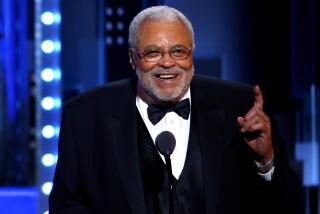Setting a Natural Tone for Broadcast Voice-Overs : Advertising: Those in the business find the days of hard sell and fast talk have given way to friendly chatter, subtle persuasion and sympathetic advice.
- Share via
LOS ANGELES — There it was again--barely perceptible but unmistakable. After numerous takes, Jim Sloyan’s voice had hit on the right combination of rhythm, tone and feeling, but there was still something not quite right.
On the playback, the word “coupe” sounded more like “coop-puh.”
In the multimillion-dollar world of voice-over work, there is little room for even an extra breath. But thanks to hundreds of thousands of dollars worth of sound equipment, the tiny puff of air at the end of the word disappeared, leaving a seamless flow of glowing words about the Lexus car.
Sloyan, a man with a rich, graveled voice warmed by cigarette smoke, is one of the often nameless, faceless people in the business of selling with sound.
Although big-name stars like Michael Douglas and Jack Lemmon have lent their voices to national advertising campaigns, many of the people pitching coffee or sports cars are far from celebrities.
That doesn’t mean star salaries aren’t in order. Despite the lack of name or voice recognition, voice-over talent in national spots can earn seven figures a year.
The work can range from doing movie trailers to radio station identification to the legalese that must be read at the end of a car ad.
“Voice-over work is very clean and very fast and the money is very, very good,” said agent Don Pitts, who has represented such recognizable vocal cords as Orson Welles, Charles Durning, Robert Stack and the late cartoon character maestro Mel Blanc.
These days, voice-over work is also very “natural.” The days of hard sell and fast talk have given way to friendly chatter, subtle persuasion and sympathetic advice. Advertisers are looking for actors who can deliver these qualities believably.
“The new phase we’re starting to see now is that they’re looking for the real person. They’re looking for somebody without a trained voice, pretty much like my neighbor or someone I work with,” Pitts said.
“A lot of the real voices are people that we would not have signed five years ago because they were not professional enough or were most likely a name that nobody would recognize,” he said. “What’s important is how you read the copy. It just has to be believable.”
*
Being natural is harder than it sounds and just tricky enough to elude even veteran actors, Pitts said.
Tom Bodet is a pioneer of the style he calls plain-spokenness, using his amiable down-home drawl to beckon people to Motel 6, where he promises to “leave the light on for you.”
Bodet’s appeal “was that I wasn’t selling anything, the idea being that I’m more of a spokesman for the people who are buying than the people who are selling,” he said. “I stand in the front of the mike and speak to my peers. . . . From the beginning it came from a plan of being sincere.”
In a business where you often have only 20 seconds to persuade someone to buy a product, a little sincerity goes a long way.
“Most people think my voice is boring,” said beer brewer Jim Koch, whose Boston Beer Co. radio ads use his slow, deliberate tones.
“One person asked if the commercials were recorded posthumously,” he said. “I don’t have a slick, exciting professional voice, but I believe I have more knowledge of my beer than anyone else. . . . I fundamentally believe people want reality. They don’t want illusion really in advertising, they want the real person who believes” in the product.
Breaking into the business requires more than a neighborly sounding voice and a genuine belief in that great hardware store or headache medicine.
“Don’t quit your day job,” Bodet warns would-be voice-over talent. “Having a good voice doesn’t mean anything. . . . I think this is one of those things in which there are a million ways to do it right and a million ways to do it wrong. You can build houses in Alaska for 10 years and fall into” the voice-over business.
*
Even those who are paid handsomely for their work often don’t consider themselves first and foremost voice-over talent. Sloyan is an actor with everything from Shakespeare to “Star Trek” to his credit.
Mark Keller, whose may-I-help-you intonations adorn Bank of America and Chevrolet ads, is a composer who says his musical background and keen sense of timing help him match the rhythm of an ad.
Bodet, a former National Public Radio commentator, is a novelist and essayist who performs audio versions of his work with the same kindly, homespun tone.
But they concede a distinctive voice has its advantages. “Every once in a while, people will recognize the voice,” Sloyan said. “When you’re making reservations, people immediately get things done.”


